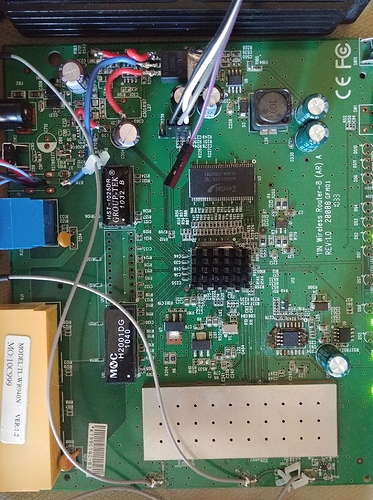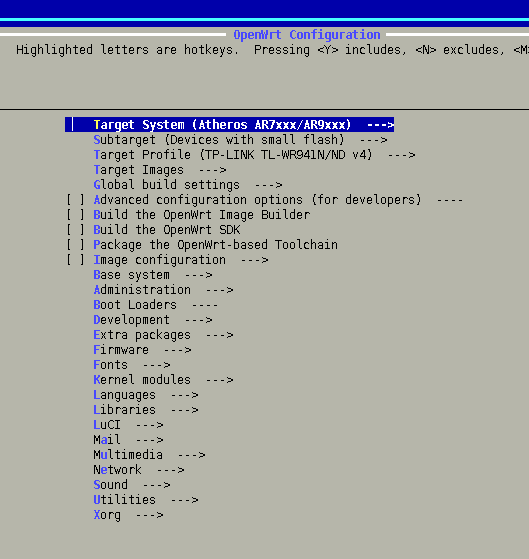Hi,
USB drivers do get registered now
U-Boot 1.1.4 (Mar 8 2010 - 10:35:18)
AP93 (ar7240) U-boot
DRAM:
sri
#### TAP VALUE 1 = 7, 2 = 8
32 MB
id read 0x100000ff
flash size 4194304, sector count = 64
Flash: 4 MB
Using default environment
In: serial
Out: serial
Err: serial
Net: ag7240_enet_initialize...
No valid address in Flash. Using fixed address
: cfg1 0xf cfg2 0x7014
eth0: 00:03:7f:09:0b:ad
eth0 up
No valid address in Flash. Using fixed address
: cfg1 0xf cfg2 0x7214
eth1: 00:03:7f:09:0b:ad
ATHRS26: resetting s26
ATHRS26: s26 reset done
eth1 up
eth0, eth1
Autobooting in 1 seconds
## Booting image at 9f020000 ...
Uncompressing Kernel Image ... OK
Starting kernel ...
OpenWrt kernel loader for AR7XXX/AR9XXX
Copyright (C) 2011 Gabor Juhos <juhosg@openwrt.org>
Looking for OpenWrt image... found at 0xbf022000
Decompressing kernel... done!
Starting kernel at 80060000...
[ 0.000000] Linux version 4.14.180 () (gcc version 7.5.0 (OpenWrt GCC 7.5.0 r11063-85e04e9f46)) #0 Sat May 16 18:32:20 2020
[ 0.000000] bootconsole [early0] enabled
[ 0.000000] CPU0 revision is: 00019374 (MIPS 24Kc)
[ 0.000000] MIPS: machine is TP-Link TL-WR941N/ND v4
[ 0.000000] SoC: Atheros AR7240 rev 2
[ 0.000000] Determined physical RAM map:
[ 0.000000] memory: 02000000 @ 00000000 (usable)
[ 0.000000] Initrd not found or empty - disabling initrd
[ 0.000000] Printing from dt init call
[ 0.000000] Primary instruction cache 64kB, VIPT, 4-way, linesize 32 bytes.
[ 0.000000] Primary data cache 32kB, 4-way, VIPT, cache aliases, linesize 32 bytes
[ 0.000000] Zone ranges:
[ 0.000000] Normal [mem 0x0000000000000000-0x0000000001ffffff]
[ 0.000000] Movable zone start for each node
[ 0.000000] Early memory node ranges
[ 0.000000] node 0: [mem 0x0000000000000000-0x0000000001ffffff]
[ 0.000000] Initmem setup node 0 [mem 0x0000000000000000-0x0000000001ffffff]
[ 0.000000] random: get_random_bytes called from 0x804456ec with crng_init=0
[ 0.000000] Built 1 zonelists, mobility grouping on. Total pages: 8128
[ 0.000000] Kernel command line: console=ttyS0,115200 rootfstype=squashfs,jffs2
[ 0.000000] PID hash table entries: 128 (order: -3, 512 bytes)
[ 0.000000] Dentry cache hash table entries: 4096 (order: 2, 16384 bytes)
[ 0.000000] Inode-cache hash table entries: 2048 (order: 1, 8192 bytes)
[ 0.000000] Writing ErrCtl register=00000000
[ 0.000000] Readback ErrCtl register=00000000
[ 0.000000] Memory: 26636K/32768K available (3371K kernel code, 133K rwdata, 476K rodata, 1196K init, 195K bss, 6132K reserved, 0K cma-reserved)
[ 0.000000] SLUB: HWalign=32, Order=0-3, MinObjects=0, CPUs=1, Nodes=1
[ 0.000000] NR_IRQS: 51
[ 0.000000] CPU clock: 400.000 MHz
[ 0.000000] clocksource: MIPS: mask: 0xffffffff max_cycles: 0xffffffff, max_idle_ns: 9556302233 ns
[ 0.000014] sched_clock: 32 bits at 200MHz, resolution 5ns, wraps every 10737418237ns
[ 0.007908] Calibrating delay loop... 265.42 BogoMIPS (lpj=1327104)
[ 0.094159] pid_max: default: 32768 minimum: 301
[ 0.099074] Mount-cache hash table entries: 1024 (order: 0, 4096 bytes)
[ 0.105683] Mountpoint-cache hash table entries: 1024 (order: 0, 4096 bytes)
[ 0.118827] clocksource: jiffies: mask: 0xffffffff max_cycles: 0xffffffff, max_idle_ns: 19112604462750000 ns
[ 0.128699] futex hash table entries: 256 (order: -1, 3072 bytes)
[ 0.134895] pinctrl core: initialized pinctrl subsystem
[ 0.141520] NET: Registered protocol family 16
[ 0.149745] PCI host bridge /ahb/apb/pcie-controller@180c0000 ranges:
[ 0.156259] MEM 0x0000000010000000..0x0000000013ffffff
[ 0.161473] IO 0x0000000000000000..0x0000000000000000
[ 0.192622] PCI host bridge to bus 0000:00
[ 0.196736] pci_bus 0000:00: root bus resource [mem 0x10000000-0x13ffffff]
[ 0.203657] pci_bus 0000:00: root bus resource [io 0x0000]
[ 0.209218] pci_bus 0000:00: root bus resource [??? 0x00000000 flags 0x0]
[ 0.215995] pci_bus 0000:00: No busn resource found for root bus, will use [bus 00-ff]
[ 0.224640] pci 0000:00:00.0: BAR 0: assigned [mem 0x10000000-0x1000ffff 64bit]
[ 0.232892] clocksource: Switched to clocksource MIPS
[ 0.239504] NET: Registered protocol family 2
[ 0.245105] TCP established hash table entries: 1024 (order: 0, 4096 bytes)
[ 0.252082] TCP bind hash table entries: 1024 (order: 0, 4096 bytes)
[ 0.258506] TCP: Hash tables configured (established 1024 bind 1024)
[ 0.265078] UDP hash table entries: 256 (order: 0, 4096 bytes)
[ 0.270937] UDP-Lite hash table entries: 256 (order: 0, 4096 bytes)
[ 0.277593] NET: Registered protocol family 1
[ 0.288715] Crashlog allocated RAM at address 0x1f00000
[ 0.295936] workingset: timestamp_bits=30 max_order=13 bucket_order=0
[ 0.310638] squashfs: version 4.0 (2009/01/31) Phillip Lougher
[ 0.316512] jffs2: version 2.2 (NAND) (SUMMARY) (LZMA) (RTIME) (CMODE_PRIORITY) (c) 2001-2006 Red Hat, Inc.
[ 0.339989] io scheduler noop registered
[ 0.343981] io scheduler deadline registered (default)
[ 0.349607] ar7200-usb-phy usb-phy: phy reset is missing
[ 0.355600] pinctrl-single 18040028.pinmux: 64 pins at pa b8040028 size 8
[ 0.363852] Serial: 8250/16550 driver, 1 ports, IRQ sharing disabled
[ 0.371184] console [ttyS0] disabled
[ 0.374882] 18020000.uart: ttyS0 at MMIO 0x18020000 (irq = 9, base_baud = 12500000) is a 16550A
[ 0.383602] console [ttyS0] enabled
[ 0.383602] console [ttyS0] enabled
[ 0.390609] bootconsole [early0] disabled
[ 0.390609] bootconsole [early0] disabled
[ 0.416632] m25p80 spi0.0: s25fl064k (8192 Kbytes)
[ 0.421513] 3 fixed-partitions partitions found on MTD device spi0.0
[ 0.427926] Creating 3 MTD partitions on "spi0.0":
[ 0.432764] 0x000000000000-0x000000020000 : "u-boot"
[ 0.439019] 0x000000020000-0x0000007f0000 : "firmware"
[ 0.445614] 2 tplink-fw partitions found on MTD device firmware
[ 0.451580] Creating 2 MTD partitions on "firmware":
[ 0.456649] 0x000000000000-0x00000014e364 : "kernel"
[ 0.462739] 0x00000014e364-0x0000007d0000 : "rootfs"
[ 0.468889] mtd: device 3 (rootfs) set to be root filesystem
[ 0.474693] 1 squashfs-split partitions found on MTD device rootfs
[ 0.480924] 0x000000420000-0x0000007d0000 : "rootfs_data"
[ 0.487494] 0x0000007f0000-0x000000800000 : "art"
[ 0.494402] libphy: Fixed MDIO Bus: probed
[ 0.834897] libphy: ag71xx_mdio: probed
[ 0.839738] libphy: ar8xxx-mdio: probed
[ 0.846798] switch0: Atheros AR724X/AR933X built-in rev. 2 switch registered on mdio-bus.0
[ 0.898344] ag71xx 19000000.eth: connected to PHY at mdio-bus.0:1f:04 [uid=004dd041, driver=Generic PHY]
[ 0.908944] eth0: Atheros AG71xx at 0xb9000000, irq 4, mode: mii
[ 1.254815] ag71xx 1a000000.eth: connected to PHY at fixed-0:00 [uid=00000000, driver=Generic PHY]
[ 1.264830] eth1: Atheros AG71xx at 0xba000000, irq 5, mode: gmii
[ 1.275056] NET: Registered protocol family 10
[ 1.287349] Segment Routing with IPv6
[ 1.291180] NET: Registered protocol family 17
[ 1.296606] 8021q: 802.1Q VLAN Support v1.8
[ 1.310586] VFS: Mounted root (squashfs filesystem) readonly on device 31:3.
[ 1.327739] Freeing unused kernel memory: 1196K
[ 1.332299] This architecture does not have kernel memory protection.
[ 2.562915] random: fast init done
[ 3.997861] init: Console is alive
[ 4.001593] init: - watchdog -
[ 6.170286] kmodloader: loading kernel modules from /etc/modules-boot.d/*
[ 6.562444] usbcore: registered new interface driver usbfs
[ 6.568176] usbcore: registered new interface driver hub
[ 6.573699] usbcore: registered new device driver usb
[ 6.623068] ehci_hcd: USB 2.0 'Enhanced' Host Controller (EHCI) Driver
[ 6.641596] SCSI subsystem initialized
[ 6.652164] ehci-platform: EHCI generic platform driver
[ 6.660075] ehci-pci: EHCI PCI platform driver
[ 6.668322] ohci_hcd: USB 1.1 'Open' Host Controller (OHCI) Driver
[ 6.676456] ohci-platform: OHCI generic platform driver
[ 6.682029] ohci-platform 1b000000.usb: Generic Platform OHCI controller
[ 6.688897] ohci-platform 1b000000.usb: new USB bus registered, assigned bus number 1
[ 6.696911] ohci-platform 1b000000.usb: irq 3, io mem 0x1b000000
[ 6.778111] hub 1-0:1.0: USB hub found
[ 6.782392] hub 1-0:1.0: 1 port detected
[ 6.790567] uhci_hcd: USB Universal Host Controller Interface driver
[ 6.799612] ohci-pci: OHCI PCI platform driver
[ 6.810086] usbcore: registered new interface driver usb-storage
[ 6.819700] usbcore: registered new interface driver uas
[ 6.825802] kmodloader: done loading kernel modules from /etc/modules-boot.d/*
[ 6.843729] init: - preinit -
[ 9.196700] random: jshn: uninitialized urandom read (4 bytes read)
[ 9.657164] random: jshn: uninitialized urandom read (4 bytes read)
[ 9.978254] random: jshn: uninitialized urandom read (4 bytes read)
[ 10.245767] urandom_read: 1 callbacks suppressed
[ 10.245779] random: jshn: uninitialized urandom read (4 bytes read)
[ 10.341491] random: jshn: uninitialized urandom read (4 bytes read)
[ 10.530252] random: jshn: uninitialized urandom read (4 bytes read)
[ 11.243856] IPv6: ADDRCONF(NETDEV_UP): eth1: link is not ready
[ 11.249830] IPv6: ADDRCONF(NETDEV_UP): eth1.1: link is not ready
Press the [f] key and hit [enter] to enter failsafe mode
Press the [1], [2], [3] or [4] key and hit [enter] to select the debug level
[ 12.274069] eth1: link up (1000Mbps/Full duplex)
[ 12.278767] IPv6: ADDRCONF(NETDEV_CHANGE): eth1: link becomes ready
[ 12.285852] IPv6: ADDRCONF(NETDEV_CHANGE): eth1.1: link becomes ready
[ 14.931251] jffs2: notice: (436) jffs2_build_xattr_subsystem: complete building xattr subsystem, 8 of xdatum (2 unchecked, 6 orphan) and 96 of xref (6 dead, 0 orphan) found.
[ 14.949694] mount_root: switching to jffs2 overlay
[ 14.999714] overlayfs: upper fs does not support tmpfile.
[ 15.014580] urandom-seed: Seeding with /etc/urandom.seed
[ 15.479886] eth1: link down
[ 15.511795] procd: - early -
[ 15.514932] procd: - watchdog -
[ 16.412965] procd: - watchdog -
[ 16.416556] procd: - ubus -
[ 16.699573] urandom_read: 1 callbacks suppressed
[ 16.699585] random: ubusd: uninitialized urandom read (4 bytes read)
[ 16.712446] random: ubusd: uninitialized urandom read (4 bytes read)
[ 16.720797] procd: - init -
Please press Enter to activate this console.
[ 18.501283] kmodloader: loading kernel modules from /etc/modules.d/*
[ 18.526015] ntfs: driver 2.1.32 [Flags: R/O MODULE].
[ 18.552369] ip6_tables: (C) 2000-2006 Netfilter Core Team
[ 18.570773] Loading modules backported from Linux version v4.19.120-0-gfdc072324f3c
[ 18.578563] Backport generated by backports.git v4.19.120-1-0-g60c3a249
[ 18.589697] ip_tables: (C) 2000-2006 Netfilter Core Team
[ 18.608236] nf_conntrack version 0.5.0 (1024 buckets, 4096 max)
[ 18.707493] xt_time: kernel timezone is -0000
[ 18.795837] PPP generic driver version 2.4.2
[ 18.803922] NET: Registered protocol family 24
[ 18.918182] ath: phy0: Ignoring endianness difference in EEPROM magic bytes.
[ 18.948494] ieee80211 phy0: Atheros AR9280 Rev:2 mem=0xb0000000, irq=12
[ 19.413515] kmodloader: done loading kernel modules from /etc/modules.d/*
[ 20.708398] urngd: v1.0.2 started.
[ 21.446474] random: crng init done
[ 44.386041] IPv6: ADDRCONF(NETDEV_UP): eth1: link is not ready
[ 44.393131] eth1: link up (1000Mbps/Full duplex)
[ 44.398383] IPv6: ADDRCONF(NETDEV_CHANGE): eth1: link becomes ready
[ 44.438570] IPv6: ADDRCONF(NETDEV_UP): eth0: link is not ready
[ 47.998750] IPv6: ADDRCONF(NETDEV_UP): wlan0: link is not ready
[ 52.174777] wlan0: authenticate with 00:27:19:d2:dc:c2
[ 52.195342] wlan0: send auth to 00:27:19:d2:dc:c2 (try 1/3)
[ 52.213267] wlan0: authenticated
[ 52.243007] wlan0: associate with 00:27:19:d2:dc:c2 (try 1/3)
[ 52.253333] wlan0: RX AssocResp from 00:27:19:d2:dc:c2 (capab=0x431 status=0 aid=3)
[ 52.261505] wlan0: associated
[ 52.283670] IPv6: ADDRCONF(NETDEV_CHANGE): wlan0: link becomes ready
[ 58.698338] eth0: link up (10Mbps/Full duplex)
[ 58.702963] IPv6: ADDRCONF(NETDEV_CHANGE): eth0: link becomes
but when I plug in the USB stick I get the following event:
[ 66.042927] usb 1-1: new full-speed USB device number 2 using ohci-platform
[ 66.332908] ohci-platform 1b000000.usb: frame counter not updating; disabled
[ 66.340023] ohci-platform 1b000000.usb: HC died; cleaning up
[ 71.073062] usb usb1-port1: attempt power cycle
I've tried adding/removing kmod-usb* modules, but nothing really changed. What could I be missing?

